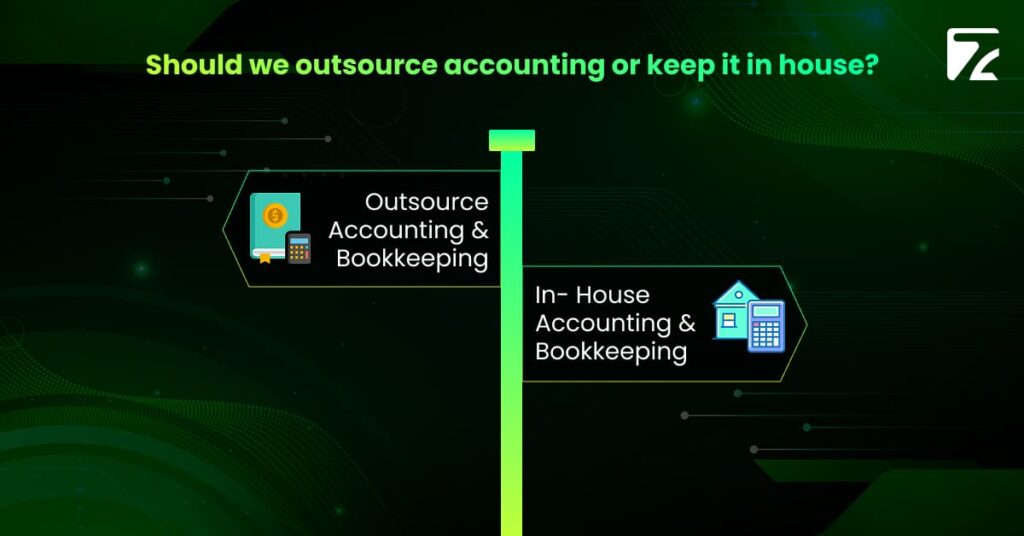How Outsourcing Bookkeeping and Accounting Saves Time and Money for Small Businesses

How Outsourcing Bookkeeping and Accounting Saves Time and Money for Small Businesses Managing finances is one of the biggest challenges for small businesses. Bookkeeping and accounting are the backbone of financial stability, ensuring cash flow tracking, tax compliance, and data-driven business decisions. Yet, for many entrepreneurs, handling these tasks in-house is an uphill battle costly, time-consuming, and often prone to errors. That’s where outsourcing bookkeeping and accounting makes a difference. Small businesses can tap into expert financial management without the overhead of hiring a full-time accountant. But how much can you really save, and what are the long-term benefits? Let’s explore how outsourcing can transform financial management for small businesses. What is Outsourced Bookkeeping and Accounting? Understanding the Difference: Bookkeeping vs. Accounting Bookkeeping and accounting are often used interchangeably, but they serve distinct functions: Bookkeeping: Focuses on recording daily financial transactions, reconciling bank statements, managing invoices, and tracking expenses. Accounting: Goes beyond recording numbers it involves financial analysis, tax compliance, reporting, and forecasting. How Does Outsourcing Work? Instead of hiring an in-house accountant, businesses partner with third-party firms that handle financial tasks remotely. These firms use cloud-based accounting software, automation, and AI-powered tools to streamline operations, ensuring real-time financial insights and error-free bookkeeping. Who Benefits from Outsourced Accounting and bookkeeping? Outsourced accounting and bookkeeping aren’t just for large enterprises. It’s a game changer for: Startups and Tech Firms: Need accurate financial reporting for investors. E-commerce Businesses: Require precise transaction tracking. Retail & Hospitality: Demand streamlined payroll and tax compliance. Consulting Firms: Benefit from optimized invoicing and expense management. Why Small Businesses Struggle with In-House Accounting Lack of Expertise & Compliance Risks Most small business owners aren’t finance experts. Misclassifying transactions, failing to reconcile bank accounts, or missing tax deadlines can lead to penalties and cash flow problems. In fact, according to the IRS, 40% of small businesses incur fines due to incorrect payroll tax filings. Additionally, lack of compliance with local and federal tax laws can lead to audits, legal complications, and financial instability. High Costs of Hiring In-House Accountants An in-house accountant costs around $50,000–$70,000 per year, plus benefits, training, and accounting software expenses. For small businesses, this isn’t always sustainable. Research from the Small Business Administration (SBA) shows that nearly 30% of small businesses fail due to financial mismanagement, often linked to improper accounting and bookkeeping practices. Investing in an in-house team may not always be feasible, especially for startups and growing businesses. Time-Consuming & Distracting Every hour spent on bookkeeping is an hour lost on sales, customer service, or business growth. Handling finances internally can take 10+ hours per week, which could be better spent scaling your business. A study by Score.org found that small business owners spend an average of 21% of their time on financial administration, taking them away from crucial revenue-generating activities. The mental stress of tracking expenses, reconciling bank statements, and ensuring compliance can also lead to burnout and reduced efficiency in other core business areas. Limited Access to Advanced Financial Insights Without an expert financial team, small businesses often lack real-time financial reporting, accurate cash flow forecasting, and strategic tax planning. This lack of financial visibility can hinder business growth, making it difficult to plan for expansions, secure funding, or optimize profit margins. Access to data-driven financial insights allows businesses to make proactive decisions rather than reacting to financial difficulties after they arise. Every hour spent on bookkeeping is an hour lost on sales, customer service, or business growth. The Benefits of Outsourcing Bookkeeping and Accounting Cost Savings: A Breakdown Expense Category In-House Accountant Outsourced Accounting Salary & Benefits $50,000 – $70,000 $5,000 – $30,000 Software Costs $500 – $5,000 Included Compliance Mistakes Potential Penalties Minimal Risk Training & Upgrades Continuous Expense Included By outsourcing, small businesses save up to 50% on bookkeeping and accounting costs. Access to AI-Driven Automation & Financial Expertise AI-powered accounting tools detect financial inconsistencies and automate repetitive tasks. Expert financial advisors ensure tax compliance and optimize financial strategies. Increased Productivity & Business Growth Business owners regain 10+ hours per week to focus on growth. automate repetitive tasks. Companies report a 15-25% increase in productivity after outsourcing accounting functions. Improved Accuracy & Compliance Professional accountants reduce tax errors and ensure IRS/state law compliance. Automated tools eliminate manual data entry mistakes, improving accuracy by 30-40%. Scalability & Flexibility Easily upgrade or downgrade services as business needs change. Access specialized services like payroll processing, financial forecasting, and tax optimization when needed. Data Security & Compliance Encrypted cloud storage ensures sensitive financial data is protected. Leading firms comply with GDPR, IRS, and SOC 2 security standards. Final Thoughts: Why Outsourcing is the Smart Choice Small businesses thrive when they focus on what they do best delivering products and services. By outsourcing bookkeeping and accounting, entrepreneurs eliminate financial stress, save money, and gain expert guidance for future growth. Whether you run an e-commerce store, a travel agency, or a consulting firm, outsourcing financial management is a strategic move that ensures efficiency, compliance, and scalability. Want a deeper understanding of which accounting functions are best to outsource? Check out our Complete Guide to Bookkeeping and Accounting Outsourcing to learn more. Frequently Asked Questions How much does outsourced bookkeeping cost for small businesses? The cost varies based on business size and service level but typically ranges between $200 and $2,500 per month. Is outsourced bookkeeping safe for my business? Yes, reputable outsourced accounting firms follow strict security protocols, including encryption and GDPR compliance, to protect financial data. Can outsourcing replace a full-time accountant? For many small businesses, yes. Outsourcing provides access to expert accountants without the overhead costs of hiring in-house. What software do outsourced accounting firms use? Most firms use cloud-based tools like QuickBooks, Xero, FreshBooks, and Sage for bookkeeping and financial reporting.
